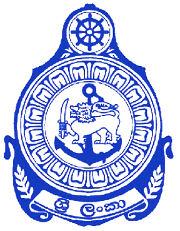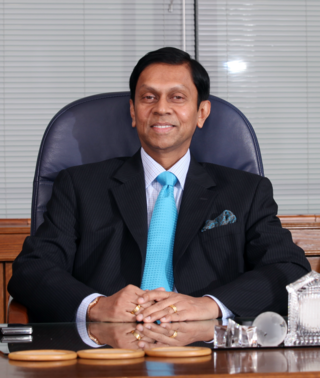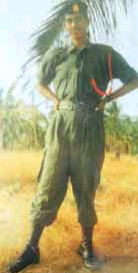Related Research Articles
Sri Lanka is a semi-presidential representative democratic republic, whereby the President of Sri Lanka is both head of state and head of government, and it relies on a multi-party system. Executive power is exercised by the President on the advice of the Prime Minister and the Cabinet of Ministers. Legislative power is vested in the Parliament. For decades, the party system was dominated by the socialist Sri Lanka Freedom Party and the conservative United National Party. The Judiciary is independent of the executive and the legislature.

The president of Sri Lanka is the head of state and head of government of the Democratic Socialist Republic of Sri Lanka. The president is the chief executive of the union government and the commander-in-chief of the Sri Lanka Armed Forces.
The title chief of staff identifies the leader of a complex organization such as the armed forces, institution, or body of persons and it also may identify a principal staff officer (PSO), who is the coordinator of the supporting staff or a primary aide-de-camp to an important individual, such as a president, or a senior military officer, or leader of a large organization.

The Parliament of the Democratic Socialist Republic of Sri Lanka is the supreme legislative body of Sri Lanka. It alone possesses legislative supremacy and thereby ultimate power over all other political bodies in the island. It is modeled after the British Parliament.
The Ceylon Defence Force (CDF) was established in 1910 by the Ceylonese legislation Ceylon Defence Force Ordinance, which reformed the Ceylon Volunteer Force (CVF) that existed previously as the military reserve in the British Crown colony of Ceylon. At the time of forming it was only a reserve force but soon developed into a regular force responsible for the defence of Ceylon. The CDF was under the command of the General Officer Commanding, Ceylon of the British Army in Ceylon if mobilised. However mobilisation could be carried out only under orders from the Governor.

The Sri Lanka Navy (SLN) is the naval arm of the Sri Lanka Armed Forces and is classed as the country's most vital defence force due to its island geography and is responsible for the maritime defence of the Sri Lankan nation and its interests. The role of the Sri Lanka Navy is to conduct operations at sea for the defence of the nation and its interests and conduct prompt and sustainable combat operations at sea in accordance with the national policies.

General Sir John Kotelawala Defence University (KDU) located at Kandawala, Ratmalana, Colombo, is state defense university of Sri Lanka which is administered by the Ministry of Defense.
The Ceylon Civil Service, popularly known by its acronym CCS, was the premier civil service of the Government of Ceylon under British colonial rule and in the immediate post-independence period. Established in 1833, it functioned as part of the executive administration of the country to various degrees until Ceylon gained self-rule in 1948. Until it was abolished on 1 May 1963 it functioned as the permanent bureaucracy or secretariat of Crown employees that assisted the Government of Ceylon.
In Sri Lanka, the Cabinet of Ministers is the council of ministers that form the central government of Sri Lanka. The body of senior ministers responsible and answerable to the Parliament of Sri Lanka. The President is a member of the cabinet and its head.
The Order of Precedence in Sri Lanka the protocol list at which Sri Lankan government officials are seated according to their rank. This is not the list of succession.
The chief justice of the Democratic Socialist Republic of Sri Lanka is the head of the judiciary of Sri Lanka and the Supreme Court of Sri Lanka. Established in 1801, the chief justice is one of ten Supreme Court justices; the other nine are the puisne justices of the Supreme Court of Sri Lanka. The post was created in 1801. The chief justice is nominated by the Constitutional Council, and appointed by the president. The first chief justice was Codrington Edmund Carrington. The 47th and current chief justice is Jayantha Jayasuriya.

The attorney general of Sri Lanka is the Sri Lankan government's chief legal adviser, and its primary lawyer in the Supreme Court of Sri Lanka. The attorney general is usually a highly respected senior advocate, and is appointed by the ruling government. The current attorney general is Sanjay Rajaratnam. The president does not have any power to make orders, mandatory or otherwise, to the attorney general. He heads the Attorney General's Department which is the public prosecutor.

Ajith Nivard Cabraal is a Sri Lankan accountant and politician who was also the 16th Governor of the Central Bank of Sri Lanka. He is also the former State Minister of Finance, Capital Markets and State Enterprise Reforms and a national list member of parliament since 12 August 2020. He served as the Governor of the Central Bank of Sri Lanka, holding the post from 1 July 2006 until his resignation on 9 January 2015. He again became the Governor of Central Bank of Sri Lanka in September 2021, replacing W. D. Lakshman, and resigned again in April 2022.

Lance Corporal W.I.M Seneviratne PWV, SLLI was a Sri Lankan soldier. After joining the Sri Lanka Army in 1987, Seneviratne served during the Sri Lankan Civil War. On July 4, 1996, while providing security to visiting Minister Nimal Siripala de Silva in the northern city of Jaffna, Seneviratne sacrificed his life to thwart a Tamil Tiger suicide bomber from assassinating Minister de Silva. He was posthumously awarded the Parama Weera Vibhushanaya, the highest military decoration awarded for gallantry in Sri Lanka.

Rajapakse Mohottige Don Suranimala Rajapaksha was a Sri Lankan politician. Rajapaksha was first elected to the Parliament of Sri Lanka in 1994 and he was the Minister of School Education in Democratic Socialist Republic of Sri Lanka in 2001 to 2004. He was a member of the United National Party (UNP) and a member of UNP Working Committee. He was also appointed as the Coordinating secretary to the prime minister Ranil Wickremesinghe in 2015. At the time of his death he acted as the special envoy (representative) to the Prime Minister. His younger son Kanishka Rajapaksha was also appointed as the Coordinating Assistant to the Prime Minister after the death of Rajapaksha. Kanishka is an Attorney at Law in his profession.
The Judiciary of Sri Lanka are the civil and criminal courts responsible for the administration of justice in Sri Lanka. The Constitution of Sri Lanka defines courts as independent institutions within the traditional framework of checks and balances. They apply Sri Lankan Law which is an amalgam of English common law, Roman-Dutch civil law and Customary Law; and are established under the Judicature Act No 02 of 1978 of the Parliament of Sri Lanka.
The 1931 New Year Honours were appointments by King George V to various orders and honours to reward and highlight good works by citizens of the United Kingdom and British Empire. They were announced on 30 December 1930.
In Sri Lanka a Member of Parliament (MP), is the title given to any one of the 225 individuals elected or appointed to serve in the Parliament of Sri Lanka.
References
- ↑ "Scheme for Issuance of Motor Vehicle Permits on Concessionary Terms". Archived from the original on 9 March 2018. Retrieved 21 March 2018.
- ↑ Mudalige, Disna (15 May 2017) "Number of duty free vehicle permits reduced: Ravi" Daily News
- ↑ Siriwardana, Ajith; Perera, Yohan (22 August 2023). "Salaries of MPs not increased for 20 years: State Minister". Daily Mirror. Retrieved 23 August 2023.